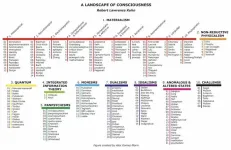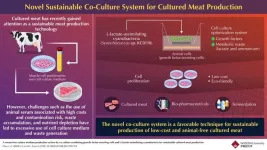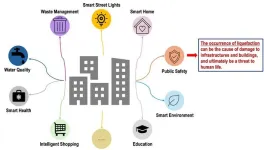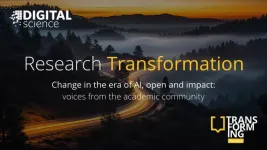Inhaled reliever therapies for asthma
JAMA
2024-10-28
(Press-News.org)
About The Study: In this network meta-analysis of patients with asthma, inhaled corticosteroids combined with formoterol and inhaled corticosteroids combined with short-acting β agonists were each associated with reduced asthma exacerbations and improved asthma control compared with short-acting β agonists alone.
Corresponding Author: To contact the corresponding author, Derek K. Chu, MD, PhD, email chudk@mcmaster.ca.
To access the embargoed study: Visit our For The Media website at this link https://media.jamanetwork.com/
(doi:10.1001/jama.2024.22700)
Editor’s Note: Please see the article for additional information, including other authors, author contributions and affiliations, conflict of interest and financial disclosures, and funding and support.
Embed this link to provide your readers free access to the full-text article This link will be live at the embargo time https://jamanetwork.com/journals/jama/fullarticle/10.1001/jama.2024.22700?guestAccessKey=dd710369-e153-4cee-b56d-c9c93d5ecf22&utm_source=For_The_Media&utm_medium=referral&utm_campaign=ftm_links&utm_content=tfl&utm_term=102824
END
ELSE PRESS RELEASES FROM THIS DATE:
2024-10-28
CHAMPAIGN, Ill. — Thin, stretchy skin — like that of a pig or human — significantly lessens the underlying damage that occurs when it’s punctured. Pig skin even outperforms synthetic materials that are designed to mimic skin, a new study finds. Its special qualities, in particular its ability to dissipate the energy of a puncturing object, greatly reduce the damage to deeper tissues, researchers report.
Their findings appear in the Journal of the Royal Society Interface.
Philip Anderson, a professor of evolution, ecology and behavior who led the study with postdoctoral researcher Bingyang Zhang at the University of Illinois ...
2024-10-28
“Out of meat, how do you get thought? That’s the grandest question.” So said philosopher Patricia Churchland to Robert Lawrence Kuhn, the producer and host of the acclaimed PBS program, Closer to Truth. Now Kuhn, a member of FQxI’s scientific advisory council, has published a taxonomy of proposed solutions to, and theories regarding, the hard problem of consciousness. He produced the organizing framework in order to explore their impact on meaning, purpose and value (if any), AI consciousness, virtual immortality, survival beyond death, and free will. Kuhn's ‘landscape of consciousness’ ...
2024-10-28
There are, without a doubt, two broad technological fields that have been developing at an increasingly fast pace over the past decade: artificial intelligence (AI) and the Internet of Things (IoT). By excelling at tasks such as data analysis, image recognition, and natural language processing, AI systems have become undeniably powerful tools in both academic and industry settings. Meanwhile, miniaturization and advances in electronics have made it possible to massively reduce the size of functional devices capable ...
2024-10-28
There is a pressing need for environmentally friendly meat production technologies to tackle the increasing global food demand. Cultured meat production is one such technology that is attracting a lot of attention as an alternative to conventional meat production. First developed in 2012, cultured meat is simply meat that is produced by growing or culturing muscle cells from animals in a laboratory.
Typically, cultured meat production requires serum (or the liquid part of the blood) from animals, which is essential for the growth of muscle cells in the culture medium since serum includes abundant proteins that promote muscle cell growth. ...
2024-10-28
Recent advances in three-dimensional (3D) scanning, particularly in photogrammetry and laser scanning, have made it possible to quickly and accurately scan complex 3D objects in the real world. These techniques generate detailed models by collecting large-scale point cloud data, representing the object's surface geometry through millions of individual points. This technology has applications in different fields, such as the 3D scanning of cultural heritage objects. By preserving these objects in digital formats, ...
2024-10-28
As urban areas expand, the threat of natural disasters becomes a pressing concern for city planners and disaster management authorities. In earthquake-prone countries like Japan, one of the critical risks to infrastructure is liquefaction, a phenomenon where intense shaking causes loose, water-saturated soils to lose their strength and behave like a liquid. Liquefaction can cause buildings to sink into the soil, crack foundations, and collapse roads and utilities like water lines.
Soil liquefaction accompanies every major earthquake, and the damage is significant. The 2011 Tōhoku earthquake in Japan caused liquefaction ...
2024-10-28
Metal peroxide (MO2, M=Ca, Sr, Ba) is an alternative to hydrogen peroxide (H2O2). It has excellent oxidative properties, superior chemical stability, high purity, and is easy to store and transport. It has been widely used in wastewater treatment and disinfection.
A Chinese research group has recently developed a novel self-cleaning electrode by constructing a micro-/nanostructure of a highly active catalyst with appropriate surface modification, achieving highly stable synthesis of alkaline-earth MO2.
This study was published in Nature Nanotechnology.
The current primary synthesis process of MO2 involves fast decomposition of H2O2, leading to insufficient utilization ...
2024-10-28
Digital Science, a technology company serving stakeholders across the research ecosystem, is today calling for greater awareness of the impact that a myriad of fast-developing technologies are having on academics and their institutions.
This follows the publication of a new report from Digital Science looking at how changing attitudes and behaviors towards research are affecting traditional research models and dynamics. Key themes to emerge from the findings relate to areas of open research, impact and evaluation, tech and AI, collaboration and research security.
The objective of the report – titled Research Transformation: Change in the era of AI, open and impact ...
2024-10-28
Researchers from the University of Oxford have identified a key biochemical mechanism relevant to the development of Huntington’s Disease. This discovery opens up the possibility of studying the disease before its clinical onset and eventually stopping its progression.
The study, published in Nature Metabolism, has shown for the first time the biochemical change responsible for the development of Huntington’s disease, and how blocking this change stopped disease progression.
Huntington's disease is an inherited condition that stops parts of the brain from working properly, leading to mental and physical decline that slowly ...
2024-10-28
The potential of human-AI collaboration has captured our imagination: a future where human creativity and AI's analytical power combine to make critical decisions and solve complex problems. But new research from the MIT Center for Collective Intelligence (CCI) suggests this vision may be much more nuanced than we once thought.
Published today in Nature Human Behaviour, “When Combinations of Humans and AI Are Useful” is the first large-scale meta-analysis conducted to better understand when human-AI combinations are useful in task completion, and when they are not. Surprisingly, the research has found that combining humans and AI to ...
LAST 30 PRESS RELEASES:
[Press-News.org] Inhaled reliever therapies for asthma
JAMA






